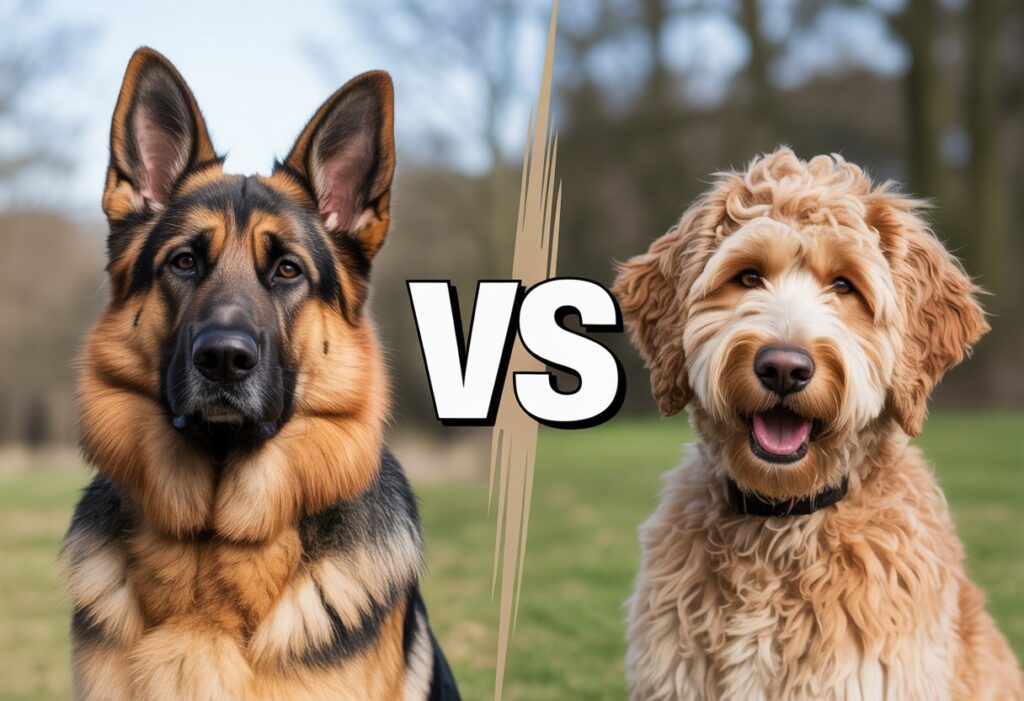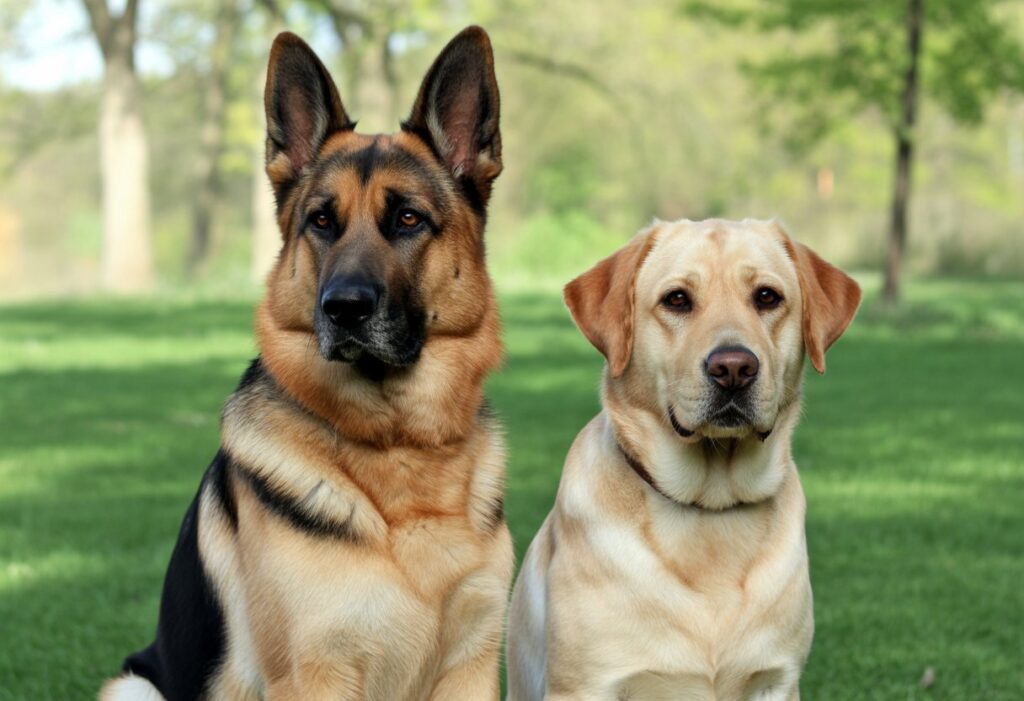Choosing between a German Shepherd and a Goldendoodle really comes down to your family’s lifestyle and what you want from a dog. German Shepherds are loyal, protective, and energetic, while Goldendoodles are friendly, social, and easier for allergy sufferers. Each breed brings its own strengths, personalities, and care needs.
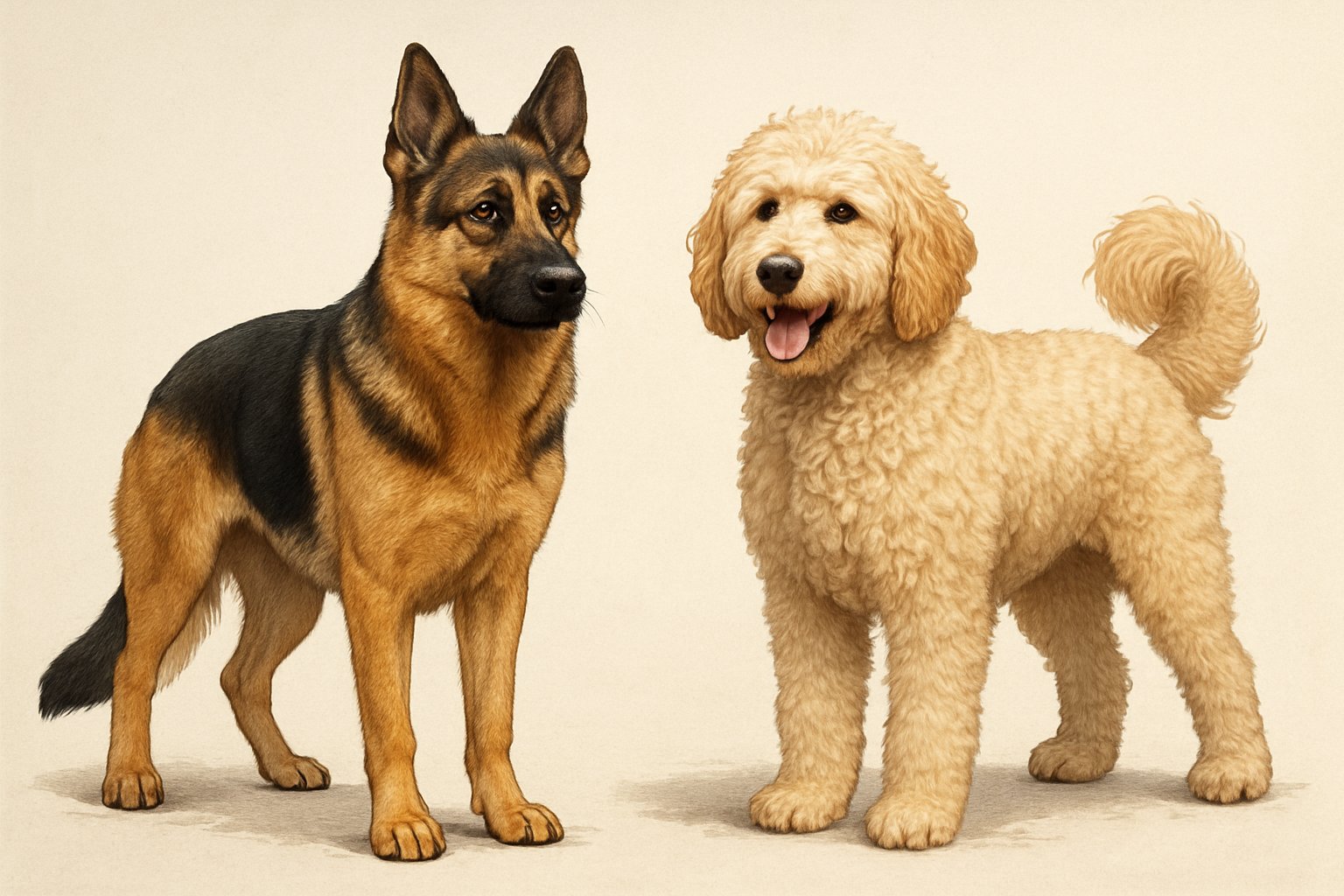
Maybe you want a smart, vigilant dog, or maybe you just want a playful, easygoing buddy. Knowing how these breeds differ in personality, exercise, and health can help you choose.
Key Takeaways
- German Shepherds and Goldendoodles have unique traits for different families.
- The breeds differ in activity needs, grooming, and care.
- Health and lifespan matter when choosing a breed.
Overview of German Shepherds and Goldendoodles
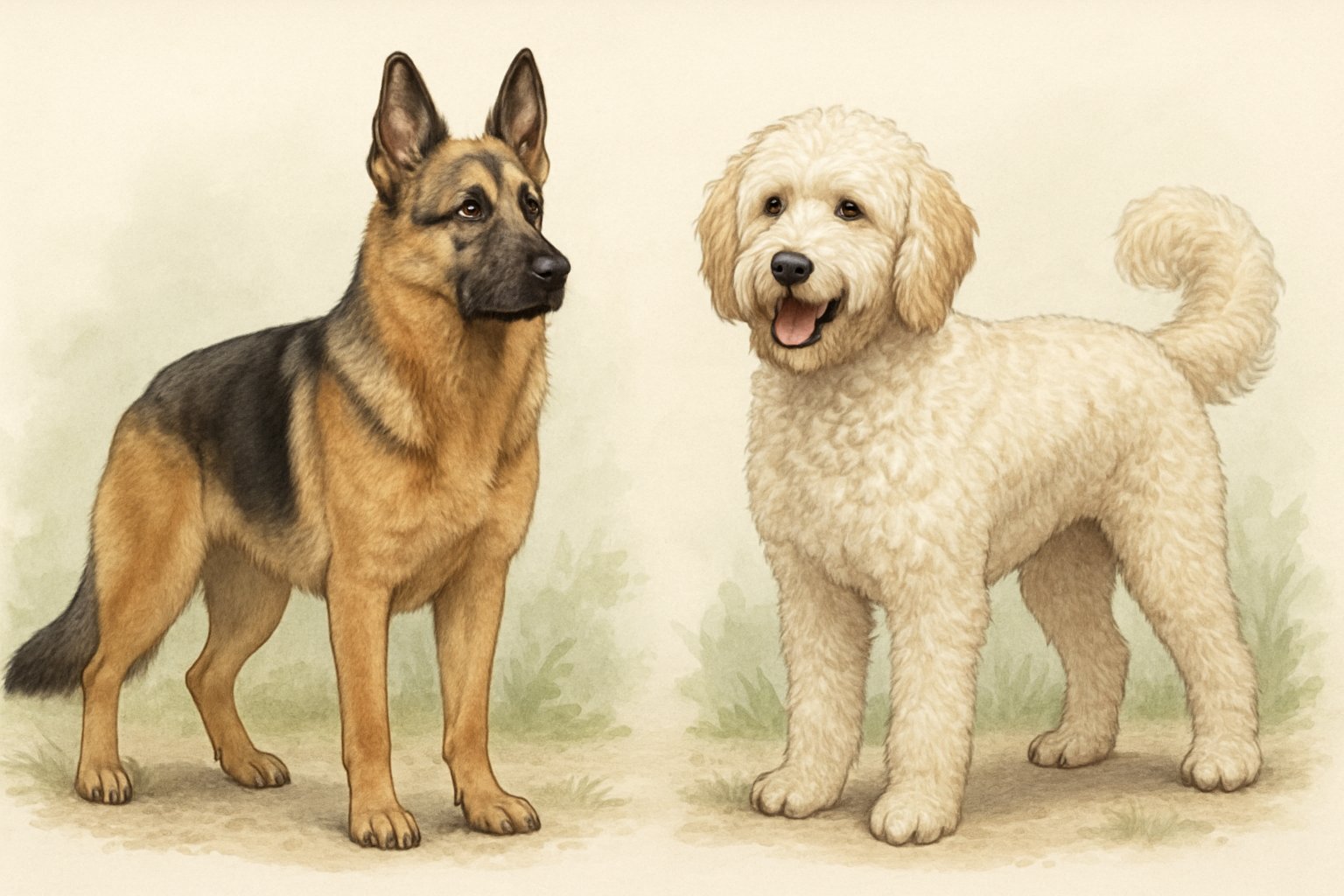
German Shepherds are famous for loyalty and intelligence. They’re versatile working dogs.
Goldendoodles, a mix of Golden Retriever and Poodle, are popular for their friendly nature and low-shedding coats.
Breed Origins and History
The German Shepherd breed began in Germany in the late 1800s. People originally bred them for herding, but their intelligence and discipline quickly made them favorites for police, military, and service work.
Goldendoodles are a much newer breed. They popped up in the 1990s, created as guide dogs for allergy sufferers. Goldendoodles come from mixing Golden Retriever and Poodle, so they get traits from both.
German Shepherds have a long, well-documented history as working dogs. Goldendoodles are mostly known as family pets and therapy dogs.
Physical Appearance
German Shepherds are large, strong, and sturdy. They stand 22–26 inches at the shoulder and weigh 50–90 pounds. Their double coats are thick, straight, and usually black and tan, though other colors exist.
Goldendoodles’ size depends on the Poodle parent. Most are 20–24 inches tall and weigh 50–75 pounds. Their coats can be wavy or curly and are often low-shedding. Colors include cream, gold, apricot, red, and occasionally black.
A quick comparison:
| Trait | German Shepherd | Goldendoodle |
|---|---|---|
| Height | 22–26 inches | 20–24 inches |
| Weight | 50–90 lbs | 50–75 lbs |
| Coat | Double, straight | Wavy or curly |
| Colors | Black/tan, others | Gold, cream, more |
Breed Popularity
German Shepherds are one of the world’s most popular dog breeds. People love their intelligence and loyalty, so they’re a top choice for families and professionals.
You’ll see German Shepherds working in law enforcement and as service dogs.
Goldendoodles have rocketed in popularity, especially in the U.S. Their friendly nature and allergy-friendly coats make them family favorites.
Many folks pick Goldendoodles for their manageable size and playful attitude.
Both breeds show up on popular dog lists, but people want them for different reasons—work for German Shepherds, companionship for Goldendoodles.
Temperament and Personality Traits
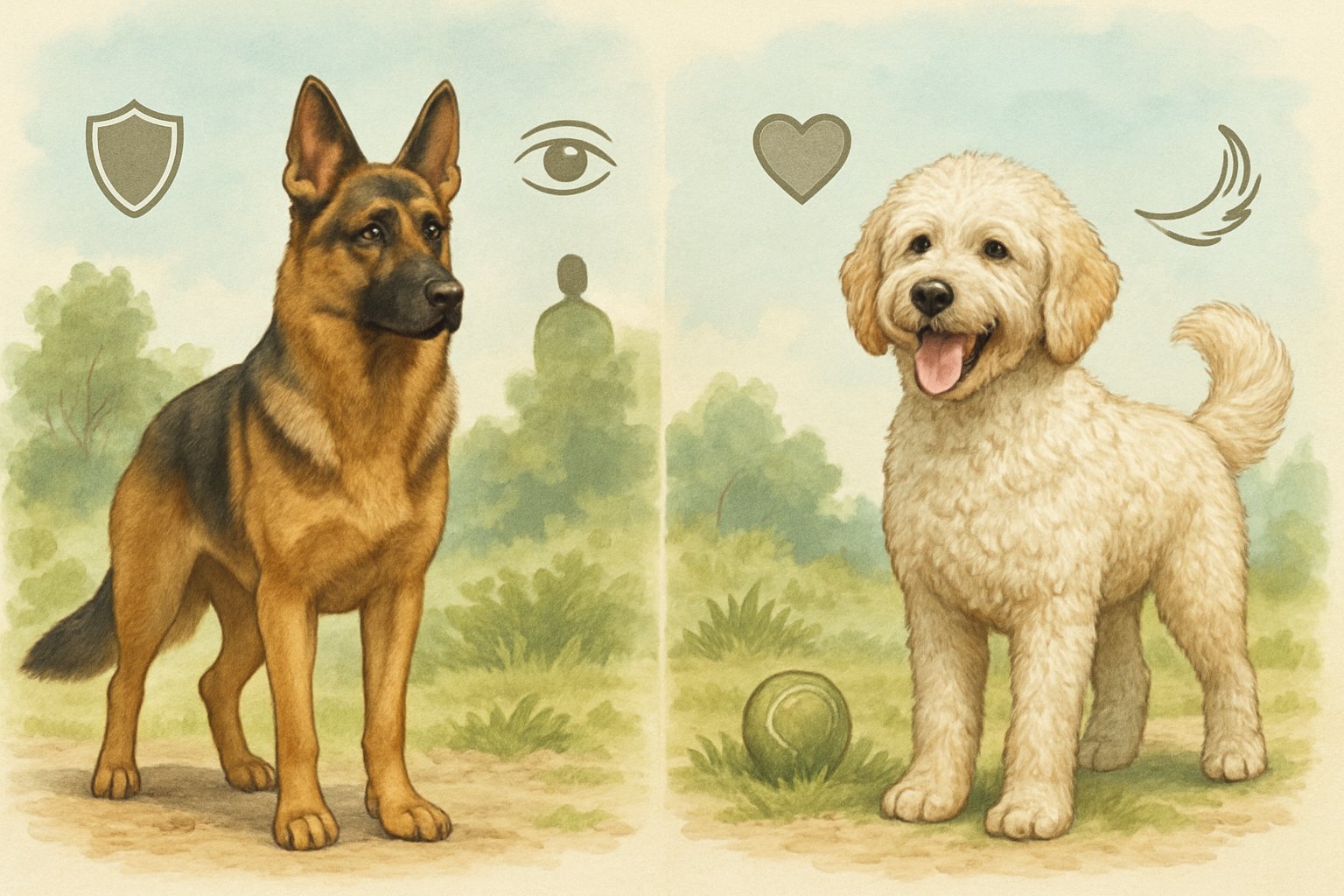
German Shepherds and Goldendoodles each have their own personalities. Both are loyal and affectionate, but they’re different when it comes to energy, social needs, and how they handle training.
Family Compatibility
German Shepherds are loyal protectors. They often bond closely with one person, but they care about the whole family. These dogs are natural watchdogs and can be cautious with strangers.
Goldendoodles are just plain friendly. They love meeting new people—kids, adults, you name it. Their gentle nature makes them a top pick for therapy work.
German Shepherds might be better for families wanting a guard dog or someone ready to give them daily attention.
Goldendoodles fit well with busy families who want a loving, playful pup that gets along with everyone.
Adaptability and Trainability
German Shepherds are sharp and quick to learn. They do well in jobs that need focus, like police work. Training works best with a confident owner who uses clear commands.
Goldendoodles love learning, especially if you use rewards. They’re usually eager to please and less stubborn than some breeds. Goldendoodles can handle changes in routine or a new environment pretty well if you start training early.
Here’s a quick comparison:
| Breed | Trainability | Adapts to Change |
|---|---|---|
| German Shepherd | Very High | Moderate |
| Goldendoodle | High | High |
Both breeds need mental and physical activity to stay happy.
Behavior With Other Pets
German Shepherds can get along with other pets if you socialize them early. Sometimes they show herding instincts or try to be in charge.
Goldendoodles are usually easy-going with other animals. Like Labradors, they’re friendly and gentle.
Early socialization helps both breeds. Setting rules early keeps things smooth between pets.
Exercise and Activity Needs
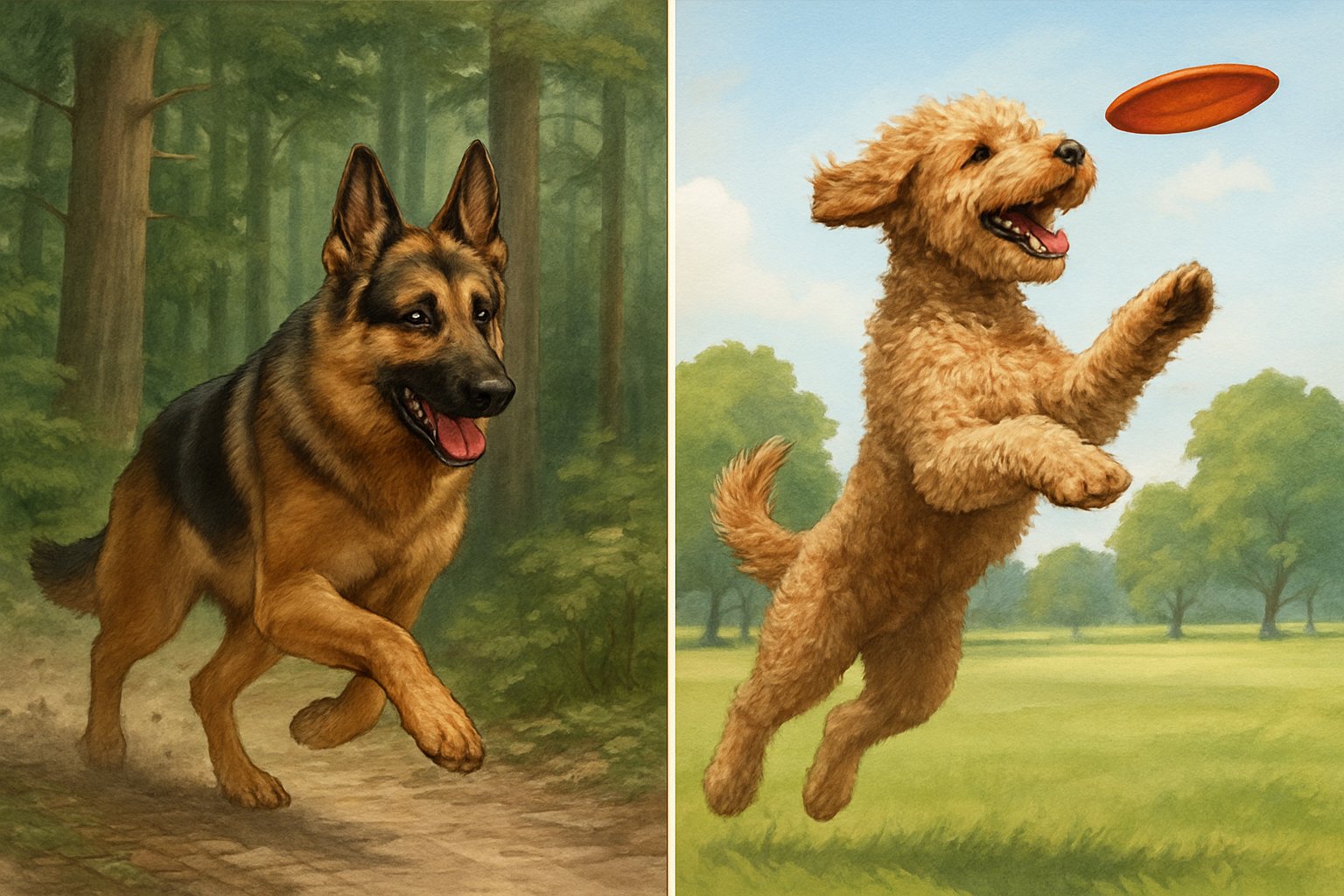
Both German Shepherds and Goldendoodles are active dogs, but they don’t have the same exercise needs or favorite activities. Picking the right activities helps keep your dog healthy and out of trouble.
Daily Exercise Requirements
German Shepherds need at least 1-2 hours of physical exercise daily. This breed was made for work and loves running, hiking, or agility. If they don’t get enough activity, they can get restless or develop behavioral issues.
Goldendoodles also need daily exercise, but their energy varies. Standard Goldendoodles usually need about an hour, while Mini or Toy sizes need less. Fetch, walks, and swimming are favorites. Goldendoodles might not have the same endurance as German Shepherds, but they love being outdoors with their people.
| Breed | Daily Exercise Needed | Favorite Activities |
|---|---|---|
| German Shepherd | 1-2 hours | Running, agility, hiking |
| Goldendoodle | 1 hour | Fetch, walking, swimming |
| Boxer | 1 hour | Playing, running, fetch |
| Siberian Husky | 1.5-2 hours | Running, pulling, hiking |
Mental Stimulation Needs
A bored dog can become destructive fast. German Shepherds need mental challenges like obedience training, puzzle toys, or advanced tricks. They love learning new things, even scent work.
Goldendoodles enjoy games that make them think—hide and seek, interactive food toys, you name it. Their Poodle side makes them quick learners, but they might not need as much challenge as a German Shepherd.
Training sessions and games keep both breeds happy and well-behaved.
Health and Lifespan Considerations
German Shepherds and Goldendoodles both have some health challenges. Their life expectancy depends on size, genetics, and how you care for them.
Common Health Issues
German Shepherds often struggle with hip dysplasia as they age. They can also get elbow dysplasia, degenerative myelopathy, and bloat.
Goldendoodles might inherit problems from both sides. They can get hip dysplasia, allergies, and ear infections because of their floppy ears. Progressive retinal atrophy (an eye disease) sometimes shows up too.
Compared to breeds like Bulldogs, Mastiffs, and Rottweilers, both German Shepherds and Goldendoodles usually have fewer breathing or heart issues. Bulldogs often have breathing trouble, while Rottweilers and Mastiffs get more joint and heart problems. Regular vet visits, good food, and exercise help prevent many of these issues.
Average Lifespan
German Shepherds usually live 9 to 13 years. Joint and degenerative problems can shorten their lives.
Goldendoodles tend to live 10 to 15 years. Their mixed background sometimes gives them a health boost, so they might reach an older age.
Breeds like Bulldogs often only live 8 to 10 years because of breathing or heart issues. Mastiffs and Rottweilers are also short-lived, closer to 7 to 10 years. With good care, German Shepherds and Goldendoodles can enjoy long, happy lives.
Grooming, Care, and Maintenance
Taking care of your dog keeps them healthy and comfortable. Each breed has its own routines, especially for their coats and feeding.
Shedding and Coat Care
German Shepherds shed a lot, all year, and even more in spring and fall. Their double coat needs brushing at least 2-3 times a week. A slicker brush or undercoat rake works best.
Goldendoodles usually shed less, especially if they’re more like the poodle parent. Their coats can be curly, wavy, or straight. Curly or wavy coats need brushing every other day to prevent tangles. A slicker brush helps, and you’ll probably need grooming clippers for trims.
A Beagle has a short coat and sheds, but weekly brushing is enough. Boston Terriers have smooth coats and need only light brushing. Golden Retrievers shed a lot and need brushing several times a week, just like German Shepherds.
Regular baths keep all these breeds clean, but don’t overdo it—too many baths dry out their skin. Stick with a gentle dog shampoo.
Diet and Nutrition
German Shepherds need a high-protein diet to keep up with their active lifestyle. Pick foods where meat tops the ingredient list.
Feed them twice a day. Keep an eye on their weight—hip problems can creep up if they get too heavy.
Goldendoodles need balanced nutrition, but portion sizes really depend on their size and how much they move around. These dogs come in mini to standard, so check your dog’s weight and maybe ask your vet for advice.
Feed a mix of protein, healthy fats, and whole grains. It’s not one-size-fits-all, so you’ll want to adjust as needed.
Beagles adore food and can pack on pounds fast. Stick with measured portions and go easy on the treats.
Boston Terriers do well on a steady diet and don’t need huge meals. Golden Retrievers burn a lot of energy and need more calories and quality protein.
Always keep fresh water out. Clean their bowls often so bacteria doesn’t get a chance to build up.
Change up your dog’s diet as they get older or if their activity shifts. That’s just part of keeping them happy and healthy.

